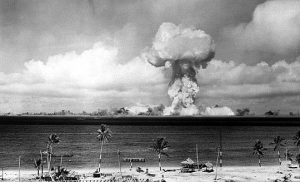With the Able nuclear test on July 1, 1946, the United States fired the opening salvo in one of the worst, and least-known, tragedies in our nation’s history. Seventy-five years later, it’s time for the Biden administration to break with the past and issue a presidential apology to victims of nuclear testing in the Marshall Islands. This action promises to address past injustices, help restore America’s moral leadership on the world stage, and foreclose the chance for similar calamities.
The United States tested 67 nuclear weapons from 1946 to 1958 in what is now the Republic of the Marshall Islands (RMI), a nation of 29 atolls located nearly halfway between Hawaii and Australia in the Pacific Ocean. At the time, the islands were under U.S. protection. The nuclear tests and their fallout had the largest impact on four northern atolls: Enewetak, Bikini, Rongelap, and Utrok, each of which was evacuated due to radiation stemming from tests with payloads up to 1,000 times greater than the bomb dropped at Hiroshima.
Today, only two of those atolls have been resettled, with no timetable for the permanent return of Marshallese to Bikini and Rongelap. Our recent studies, amidst a large body of work from the U.S. Department of Energy, demonstrate that radiological contamination in these locations is a continuing problem. Given the United States’ unique culpability in the suffering of the Marshallese people, the U.S. must apologize for its actions.
This would not be an unprecedented step. President Bill Clinton apologized in 1997 to the victims of the Tuskegee experiment in a public ceremony at the White House. Central to both episodes are issues of race and racism – with people of color targeted and harmed at each turn – as well as the role scientists played in wounding communities in the name of knowledge and progress. Given these points of similarity, the Tuskegee apology provides a pertinent historical template.
The apology to the Marshallese must include an open and honest acknowledgement of missteps, a commitment to concrete goals that can better the lives of those in affected communities, and — most critically — a pledge to never again commit such atrocities in the name of the American people. However, the ceremony would not only be a grim recognition of past injustices; it would also provide an opportunity to celebrate the lives of the survivors and their descendants.
In the Marshall Islands, increased resources should be directed toward environmental cleanup and efforts to protect the Marshallese from the confluence of radioactivity and global warming. Local organizations, such as the recently created RMI National Nuclear Commission, provide critical pathways for the impacted community — as opposed to Washington bureaucrats — to direct funding. At the same time, lessons and perspectives from the Marshall Islands must be incorporated into U.S. school curricula. As educators, we understand the power of open communication about our nation’s missteps. How are our young people supposed to learn from the mistakes of the past if this history is hidden from them?
Finally, a promise to end the testing of nuclear weapons is also necessary. This can be accomplished by ratifying at last the Comprehensive Nuclear Test Ban Treaty (CTBT), which was signed by Clinton, but never approved by the Senate. The treaty negotiations present an opportunity for bipartisan cooperation since it must be approved by a two-thirds Senate majority. In an era of polarization, it is important to send a message to the world that the United States is still able to come together on critical issues central to its values.
By righting a historical wrong, this apology would not only demonstrate U.S. moral leadership after four years of diminished presence on the world stage. It would also pave the way for continued good relations with one of our nation’s closest allies. Future cooperation with the RMI, which is home to the Ronald Reagan Ballistic Missile Defense Test Site and thousands of U.S. Army personnel and contractors, is critical to the country’s national defense.
As Biden works to lead the country into a better future, he cannot forget the past. When and where we were wrong — as was the case in the Marshall Islands — we should apologize. The American people expect nothing less of their children. They should demand as much of their government.

































